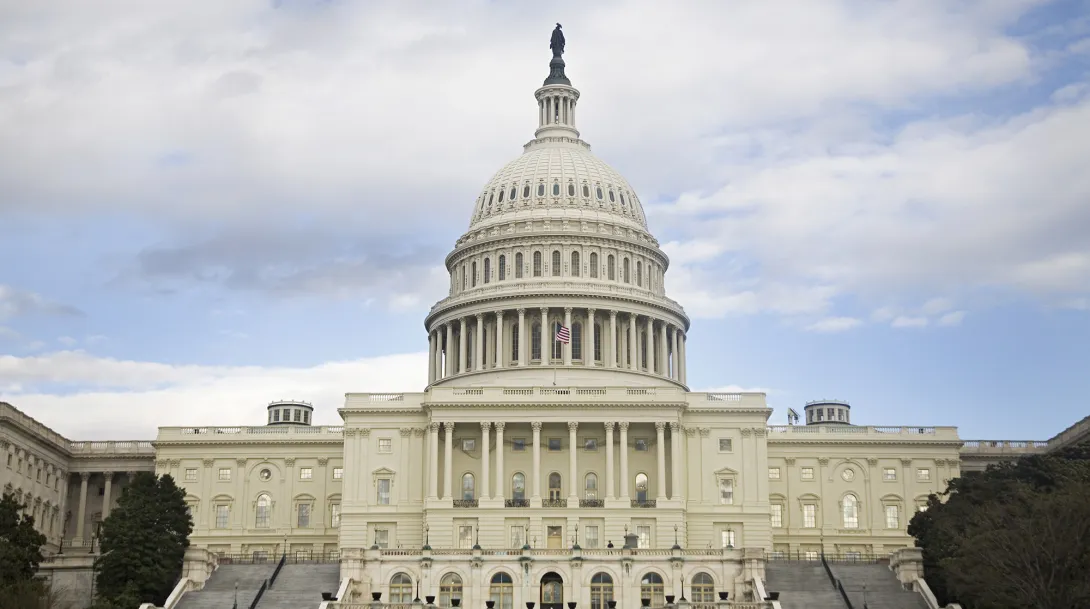
Photo: Michael Duva/Getty images
The American Hospital Association and several physician groups are urging Congress to reject cuts to Medicaid in the proposed budget resolution.
The AHA said even a small portion of the proposed cuts would destabilize hospitals and health systems.
Slashing already-low Medicaid payment rates would make it harder for physicians to provide care to people covered under Medicaid and would ultimately increase healthcare costs as patients are forced to forgo vital preventive care, physician groups said.
On Wednesday, House Republicans released a budget resolution for fiscal year 2025 that instructs seven committees to come up $1.5 trillion in mandatory cuts over 10 years.
The bill instructs the House Energy and Commerce Committee – which has jurisdiction over a number of healthcare programs, including Medicaid – to cut mandatory spending in healthcare by no less than $880 billion, according to the AHA.
The House began a markup of the budget resolution on Thursday morning.
The budget resolution does not explicitly state there will be an $880 billion cut to Medicaid, according to Newsweek. House Republicans are enabling the Energy and Commerce Committee to decide what exact programs and areas would be cut under the budget.
However, many fear Medicaid will be the target as Republicans have eyed trimming the program in the past. The GOP failed in its attempt to cut Medicaid spending during Trump's first administration, according to The Hill.
On Tuesday, House Republican leaders downplayed the possibility of cuts to Medicaid, according to The Hill report. Speaker Mike Johnson (R-La.) and Majority Leader Steve Scalise (R-La.) said the Medicaid changes under discussion include work requirements and fraud reduction, not drastic cuts such as lowering the federal match for Medicaid expansion states or instituting a per capita cap.
On Wednesday, the Senate Budget Committee also began marking up its own fiscal year 2025 budget resolution.
The House and Senate must pass a common budget resolution to move forward with the reconciliation process. The Senate is expected to consider the Budget Resolution next week on the Senate floor, according to the AHA.
WHY THIS MATTERS
Hospitals and physicians are urging Congress to consider the impact of reduced funding for the program.
"As the Senate and House Budget Committees begin deliberations on their Fiscal Year 2025 budget resolutions, the American Hospital Association urges Congress to take seriously the impact of reductions in healthcare programs, particularly Medicaid," said AHA President and CEO Rick Pollack by statement. "While some have suggested dramatic reductions in the Medicaid program as part of a reconciliation vehicle, we would urge Congress to reject that approach. Medicaid provides healthcare to many of our most vulnerable populations, including pregnant women, children, the elderly, disabled and many of our working class."
Even a small portion of the proposed reductions could have wide-ranging negative consequences for the health and well-being of both Medicaid enrollees and the broader healthcare system, the AHA said. Reductions would strip access to healthcare for vulnerable populations and destabilize hospitals and health systems, the AHA said.
Physician groups have collaborated on a statement to protect Medicaid.
The American Academy of Family Physicians, the American Academy of Pediatrics, American College of Obstetricians and Gynecologists, American College of Physicians and American Psychiatric Association said: "Our organizations, representing more than 400,000 physicians who serve millions of patients, are alarmed by proposals to implement cuts or other structural changes to Medicaid during the budget reconciliation process. Cuts to Medicaid will have grave consequences for patients, communities and the entire healthcare system. With reduced federal funding, it will be harder for patients to access care, states will be forced to drop enrollees from coverage, and it will limit the healthcare services patients can access and cut payment rates. Slashing already-low Medicaid payment rates will make it even harder for physicians to provide care to people covered under Medicaid and will ultimately increase health care costs as patients are forced to forgo vital preventive care."
Email the writer: SMorse@himss.org